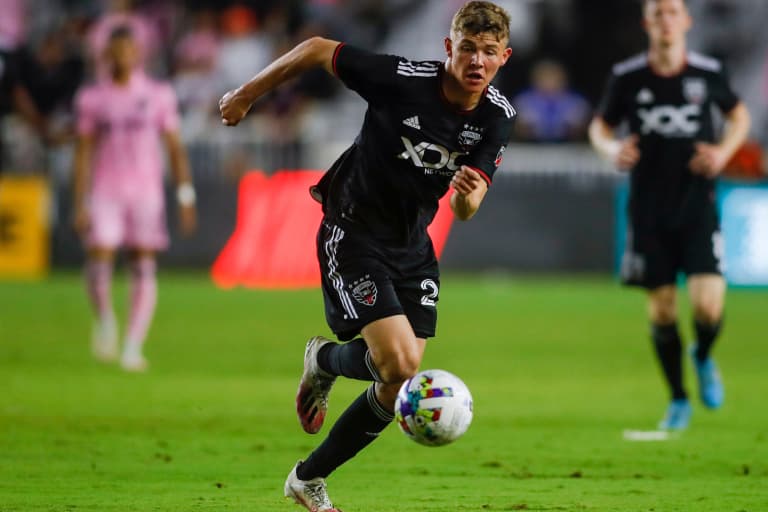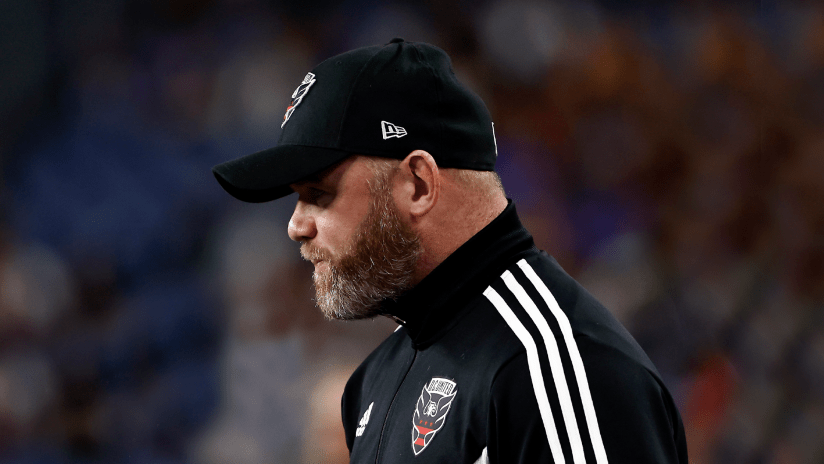LEESBURG, Va. – Making his Premier League debut at 16, earning his first full England cap a few months later, Wayne Rooney once walked the path himself. He knows a thing or two about being a teenage phenom, and two decades later still holds several ‘youngest-ever’ records for both club and country.
Even at that, however, his swift, dramatic promotion of young talent in his first few weeks in charge of D.C. United is striking.
“There’s no point in having an academy if you're not going to use it,” the English icon explained to MLSsoccer.com in his typically understated fashion at D.C.'s training facility last week.
Their pricey move for Belgian star Christian Benteke has hogged the headlines and veterans like Victor Pálsson and Ravel Morrison were signed to shore up a first team on course to finish last in the league. Yet the Black-and-Red have done just as much business, if not more, at the other end of the age spectrum since Rooney arrived.
Youth revolution
United acquired 21-year-old goalkeeper David Ochoa from Real Salt Lake and this week promoted Kristian Fletcher, 17, and Matai Akinmboni – who at 15 is the second-youngest signing in the club’s history behind Freddy Adu – from their USL Championship side Loudoun United to the first team via MLS homegrown contracts. Fletcher is a product of Bethesda SC (where Jeremy Ebobisse, Gedion Zelalem and others played their youth ball) who trained at Manchester United and Borussia Dortmund before returning home to sign with Loudoun at the start of this year, and made his MLS debut in Wednesday’s 2-1 upset win over New York City FC.
Meanwhile incumbent homegrown midfielder Jackson Hopkins has started all but two of D.C.’s matches since Rooney was hired (and appeared as a substitute in those other two), with the new boss’ high regard for the 18-year-old a key factor in the decision to trade Julian Gressel to Vancouver. Theodore Ku-DiPietro, 20, has also seen an uptick in minutes and 22-year-old academy alum Chris Durkin has been a regular since rejoining the club after a stint in Belgium.
Conversely, those judged not to fit into Rooney's philosophy have moved on, like talented midfielder Moses Nyeman, sold to Belgium's SK Beveren for a reported $350,000 transfer fee and 25% sell-on clause.
“I always think to bring academy players up brings a good energy,” explained Rooney. “Everyone wants the young players to do well, everyone wants to develop the young players, and I think it's always a great story when you get a young player, especially a local lad, come into the first team. So for instance, Jackson has been one of the most consistent players since I've been here as coach.
“You get ups and downs with young players. That's understandable,” he added. “But I think with Jackson, what's really impressed me is how consistent he's been in his performances. But also, you give him information, you only have to tell him once, which is rare with young players. He knows the game, I've played him in different roles. And his ability to pick up that role and pick up the information I'm giving him is first-class. So I think he's got a very bright future. Certainly over the next two or three years, I think he will play for the national team.”

"There's enough talent in this region"
Rooney’s focus on youth is music to the ears of United’s academy staff, who have quietly been grinding away on the long-term effort of revitalizing a program with ample talent in its region but a star-crossed history of utilizing it.
“First thing he said to me when I met him was, ‘who are the next guys?’” said D.C.’s academy director Patrick Ouckama of Rooney. “That’s where his mind is; obviously that’s where his history is as a player. And so it was really exciting to not only hear that when I met him, but to see him take immediate action and sign young kids that he's excited about. These are exciting times for all of us in [youth] development here at D.C.”
When Ouckama arrived from the New England Revolution a year ago, he encountered an operation laboring under heavy cutbacks imposed by the COVID-19 pandemic, with only two full-time employees at the time. The academy was also constrained by infrastructure, with United’s new training facility in the Virginia exurbs still under construction, one of several factors in D.C.’s struggles to fully connect with a massive local player pool stretched across a large, densely populated area stretching from Baltimore in the north to Loudoun County in the west and Prince William in the south.
Always well-represented in US youth national teams, the DMV region has for decades produced a wealth of future pros. Many rose through clubs other than United, however, due to the club’s inconsistent levels of investment in the academy space, logistical issues with transportation, turf battles with area youth clubs and coaches and a range of other reasons.
One of Ouckama’s first moves was to build out a much heftier scouting system, led by Trevor Singer, a longtime youth and college coach with a decade of experience in the area.
“There's enough talent in this region. Everybody knows that if we can get the infrastructure right, get the scouting right, get the recruiting right within the DMV, we can compete with anyone in the country,” said Ouckama.
“There's a scouting director, there's two scouting coordinators, and then there's a network of per-diem scouts that we work with. This is important for us, especially in a region like this, to make sure that we know about these kids a year, two years in advance and so we're building that database leading up to our youngest teams in the academy, and then still evaluating our teams and talent, and late-developing talent, as they go through those academy ages.”
Emphasizing younger age groups in hopes of bringing prospects into D.C.’s environment earlier in their development, Singer and his scouts watch as many as two dozen matches a weekend. They also solicit tips and recommendations from a wider web of contacts that spans some 30 coaches, directors and other talent-spotters, then work to objectively categorize all that data.
“We build player profiles based on position and they have certain characteristics, and then we evaluate those players in those positions based on what we call our key qualities; we have six of them,” explained Singer. “Each kid is evaluated on a quantitative scale for those key qualities. And so then we are able to get a quantitative number after every time we see them. And then obviously, we see each kid multiple times.”
United’s leadership has also dialed up its commitment, not just via employees – Ouckama says the staff has tripled in size since his arrival – but transportation logistics in a place infamous for its long commutes and rush-hour gridlock.
Starting this fall, vans are ferrying academy players in need of assistance to their training sessions at Segra Field in Leesburg, from four distant areas across the metropolitan region: Baltimore, Woodbridge, Virginia and Montgomery and Prince George’s counties in Maryland. Those spots have shown high concentrations of talent, including prospects from blue-collar backgrounds whose families may lack the resources to manage long soccer commutes.
“Regardless of where our facility is, it's kind of not ideal at the end of the day for anyone at a certain point. So if it's in Northern Virginia, it makes it difficult for the Maryland families. If it's in Maryland, it makes it difficult for the Northern Virginia families, because of traffic,” said Singer. “So as we navigate through that, we're just trying to create the best environment and model for the academy for the future.
“The club has definitely not had all the best players all the time in the past, and I think everybody knows that, for different reasons. But the landscape is changing dramatically in a short period of time.”
Proven development
July brought a useful boost as United's under-16 side won their age group's MLS NEXT Cup championship, led by Akinmboni and Ignacio Alem, who would represent D.C. in the inaugural MLS NEXT All-Star Game in Minnesota last month.
Rooney earned plaudits for his developmental work at his previous club, Derby County, where he blooded nearly a full squad of youngsters. It was something of a necessity given the Rams’ severely cash-strapped realities during his time in charge. But he leaves little doubt that more kids are on the way up from D.C.’s academy, with another 15-year-old, attacking midfielder Gavin Turner, set to spend the next month or so with the pros.
“I done it last year as well at Derby where, through the circumstances, we bought a lot of young players through, gave a lot of debuts to academy players. So I have no problem doing that,” Rooney said last week. “I’ll have young Gavin in today training with us, he’ll play [games] with the academy at the minute but he’ll be training a lot with us over the next three to four weeks.
“It doesn't make sense to bring a player in and let him have one or two training sessions. You’re never going to see the best of them. So I always like to bring players in and give them a few weeks, firstly to settle them to training with the first team, and then really show what they can do,” he continued, adding that he plans to work with academy coaches on aligning the youth teams' playing style with his this winter. “For the young players, it's a good opportunity for them to come in and impress me, and if you do that, you will get a chance.”
United’s recurring difficulties in maximizing their region’s rich youth landscape are interspersed with encouraging homegrown cases like Bill Hamid, Andy Najar and club-record sale Kevin Paredes, the skillful homegrown wingback who moved to VfL Wolfsburg on a $7.35 million transfer fee last winter. Ouckama notes how inspiring Paredes’ success has been for the academy kids following in his footsteps, and Singer, who once scouted for the Philadelphia Union, points to D.C.’s neighbors up I-95 as an example of what’s possible in this space.
There’s something fitting about the idea of Rooney, a one-time wunderkind whose contract is reportedly only guaranteed through next season, being the one to stitch it all together for the Black-and-Red.
“Firstly, we need to improve results on the pitch. But we have to look to the future as well, and not just focus on the next few months,” said the Englishman. “We have to focus on the next few years and developing the best players from the academy and getting them regular first-team football. That might be in two, three, four years’ time where you see the difference of what we're trying to do. But it's important we really put that in place.
“The first thing is, they need a chance. Every coach is different, some coaches won't even acknowledge the academy, I've seen throughout my time in England as well. So I think for the academy lads who are training, they know that they've got a coach who will give them a chance if they’re doing the right things and they’re good enough.”
D.C.’s kids have most assuredly taken note.
“Yeah, especially Wayne wanting to play, or not hesitating to play young players sometimes, like, you can see Jackson, the last few games he's been starting and doing very well,” said Ku-DiPietro after United’s friendly with Bayern Munich last month, in which he scored and was for long stretches the home side’s most effective performer. “So all eyes on us, really. Everybody has a chance, everybody has a shot.”










